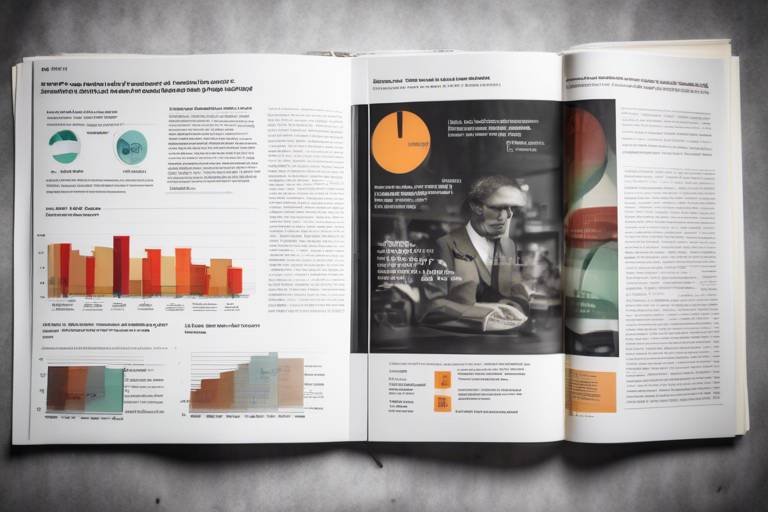The Role of Independent Review Boards in Research
Independent Review Boards (IRBs) play a pivotal role in the landscape of research, acting as guardians of ethical standards and participant welfare. Imagine a safety net that not only catches those who might fall but also ensures that the framework supporting them is robust and sound. These boards are not just bureaucratic hurdles; they are essential players in the research process, ensuring that the rights and safety of participants are prioritized above all else. In a world where research can sometimes tread into murky ethical waters, IRBs shine a light, guiding researchers towards responsible practices.
At their core, IRBs are tasked with reviewing research proposals to assess their ethical implications. This includes evaluating the potential risks involved, the informed consent process, and how well the research aligns with established ethical standards. By doing so, they help to foster a culture of integrity and respect within the research community. It's like having a wise mentor who ensures that you don’t take unnecessary risks while pursuing your goals.
The impact of IRBs extends beyond just compliance with regulations; they also enhance the credibility of research findings. When participants know that their rights are being safeguarded by an independent body, they are more likely to engage in research studies. This trust is crucial, as it can significantly influence the success of research initiatives. In essence, IRBs not only protect participants but also bolster the overall integrity of the scientific process.
Moreover, the role of IRBs is continually evolving in response to the changing landscape of research methodologies and ethical considerations. As new technologies and approaches emerge, IRBs must adapt and refine their review processes to ensure that they remain effective. This dynamic nature of IRBs is akin to a river that flows and changes course, always seeking the best path forward while navigating around obstacles.
In conclusion, Independent Review Boards are indispensable to the research ecosystem. They uphold ethical standards, protect participants, and ensure that research is conducted responsibly. The next time you read about a groundbreaking study or hear about innovative research, remember that behind the scenes, IRBs are working diligently to ensure that the journey from hypothesis to conclusion is as safe and ethical as possible.
- What is the primary function of an IRB? The main role of an IRB is to review research proposals to ensure the ethical treatment of participants and compliance with regulatory standards.
- Who can be a member of an IRB? IRBs typically consist of diverse members, including scientists, ethicists, and community representatives, to provide a well-rounded perspective on research protocols.
- How does an IRB protect research participants? An IRB evaluates the risks and benefits of research studies, ensuring that participants are fully informed and their rights are safeguarded throughout the research process.
- What challenges do IRBs face? IRBs encounter challenges such as balancing regulatory compliance with innovation, managing conflicts of interest, and streamlining the review process to keep pace with the growing volume of research proposals.

Understanding Independent Review Boards
Independent Review Boards, commonly known as IRBs, are pivotal in the realm of research, acting as watchdogs that ensure the ethical treatment of participants. Imagine a safety net, meticulously woven to catch any potential ethical missteps before they can harm individuals involved in clinical trials or social research. These boards are not just bureaucratic hurdles; they are essential guardians of human rights in research settings.
At their core, IRBs are tasked with reviewing research proposals to ascertain that they adhere to ethical standards. This involves a thorough examination of the research design, potential risks to participants, and the measures in place to mitigate those risks. The objective is to ensure that the rights, safety, and well-being of participants are prioritized above all else. The process is akin to a team of seasoned referees, ensuring that the game is played fairly and ethically, with all players (participants) treated with respect and dignity.
IRBs come into play at various stages of research, from the planning phase to the actual execution of the study. They evaluate the research methodology, the informed consent process, and the overall impact of the research on individuals and communities. This oversight is crucial, especially in studies involving vulnerable populations who may not fully understand the implications of their participation. In essence, IRBs are the ethical compass guiding researchers through the complex landscape of human subjects research.
Moreover, the composition of an IRB is designed to reflect a diverse range of perspectives. Typically, an IRB includes professionals from various fields such as medicine, ethics, law, and even laypersons who can provide insights into community values and expectations. This diversity is vital, as it ensures that the board can evaluate research proposals from multiple angles, fostering a more comprehensive understanding of the ethical implications involved.
In summary, understanding the role of IRBs is crucial for anyone involved in research. They are not merely regulatory bodies; they are essential partners in the research process, ensuring that ethical standards are upheld, and that the dignity and rights of participants are always at the forefront. Without IRBs, the integrity of research would be significantly compromised, leading to potential abuses and ethical violations that could have far-reaching consequences.

The Importance of Ethical Oversight
When we think about research, especially in fields like medicine and psychology, the term ethical oversight might not be the first thing that pops into our minds. However, it’s one of the most crucial elements that ensure research is conducted responsibly. Imagine a world where researchers could conduct studies without any checks or balances—sounds risky, right? That's where Independent Review Boards (IRBs) come into play. They act as the guardians of ethical standards, ensuring that the rights and welfare of participants are prioritized above all else.
Ethical oversight by IRBs isn’t just a bureaucratic hurdle; it’s a vital process that protects participants from potential harm. By carefully reviewing research proposals, IRBs aim to minimize risks while maximizing the potential benefits that research findings could offer society. Think of it like a safety net—without it, participants might be exposed to unnecessary risks that could lead to physical or psychological harm.
One of the key functions of ethical oversight is to ensure that research is conducted in a way that respects the dignity and autonomy of participants. This means that researchers must obtain informed consent from participants, which involves explaining the nature of the research, any potential risks, and the benefits involved. Without this process, participants may feel like mere subjects in an experiment rather than active participants in a study. An ethical IRB will scrutinize consent forms to ensure they are clear, comprehensive, and respectful of participants’ understanding.
Moreover, ethical oversight contributes significantly to the credibility of research. When researchers know their protocols will be reviewed by an IRB, they are more likely to adhere to ethical standards, thereby enhancing the integrity of their findings. This doesn’t just protect participants; it also fosters public trust in research outcomes. After all, who wants to rely on research that hasn’t been vetted for ethical compliance? In this way, ethical oversight serves as a bridge between researchers and the communities they serve, ensuring that the research conducted is not only scientifically valid but also ethically sound.
In summary, the importance of ethical oversight cannot be overstated. It safeguards participants, enhances the credibility of research, and fosters trust between researchers and the public. Without this crucial oversight, the research landscape would be fraught with ethical dilemmas and potential harm to individuals involved. As we continue to advance in various fields of study, the role of IRBs and their commitment to ethical oversight remains a cornerstone of responsible research practices.
- What is the primary role of an IRB? An IRB reviews research proposals to ensure that ethical standards are maintained and that participants' rights and welfare are protected.
- How does ethical oversight benefit participants? It minimizes risks to participants while maximizing the potential benefits of the research.
- What is informed consent? Informed consent is the process of providing participants with clear information about the research, including potential risks and benefits, allowing them to make an informed decision about their participation.

Historical Context of IRBs
The establishment of Independent Review Boards (IRBs) can be traced back to a series of unethical research practices that shocked public conscience and highlighted the dire need for ethical oversight in research. One of the most infamous examples that catalyzed this movement was the Tuskegee Syphilis Study, which ran from 1932 to 1972. In this study, hundreds of African American men were misled and denied treatment for syphilis, all in the name of research. Such blatant disregard for human rights and dignity ignited a firestorm of ethical scrutiny, leading to calls for a more structured approach to research ethics.
In response to these egregious violations, the U.S. government established regulations and guidelines aimed at protecting research participants. A pivotal moment in this journey was the publication of the Belmont Report in 1979. This report laid the foundational principles of respect for persons, beneficence, and justice, which continue to guide IRB operations today. It emphasized the necessity of informed consent and the importance of balancing risks and benefits in research endeavors.
Furthermore, the establishment of federal regulations, particularly the Common Rule (45 CFR 46), in 1981 provided a framework for IRBs to operate effectively. These regulations mandated that all institutions receiving federal funding for research involving human subjects must have an IRB in place. This move not only formalized the role of IRBs but also expanded their influence across various fields of research, ensuring that ethical considerations became a standard part of the research process.
As IRBs evolved, they began to incorporate members from diverse backgrounds, including ethicists, scientists, and community representatives, to ensure that multiple perspectives were considered in their reviews. This diversity is crucial, as it allows IRBs to better assess the ethical implications of research protocols and to advocate for participants' rights and welfare.
Today, IRBs are an integral part of the research landscape, serving as a safeguard against potential abuses and ensuring that research is conducted with the utmost respect for human dignity. Their historical context underscores the importance of vigilance in ethical oversight and the ongoing commitment to protecting research participants.
- What is the primary function of an IRB? The primary function of an IRB is to review research proposals to ensure that the rights and welfare of participants are protected.
- Why are IRBs necessary? IRBs are necessary to prevent unethical practices in research and to ensure compliance with federal regulations.
- How do IRBs ensure informed consent? IRBs ensure informed consent by reviewing consent forms and processes to make sure they are clear and comprehensible to participants.
- What challenges do IRBs face today? IRBs face challenges such as balancing regulatory compliance with the need for innovative research and managing the increasing volume of proposals.

Key Milestones in IRB Development
The journey of Independent Review Boards (IRBs) has been marked by several pivotal milestones that have shaped their role in ethical research oversight. One of the earliest and most significant events was the release of the Belmont Report in 1979. This report established foundational ethical principles for conducting research involving human subjects, emphasizing respect for persons, beneficence, and justice. These principles laid the groundwork for the ethical review processes that IRBs would adopt, ensuring that the rights and welfare of participants are prioritized.
Following the Belmont Report, the Federal Policy for the Protection of Human Subjects, also known as the Common Rule, was implemented in 1991. This regulation provided a standardized framework for IRBs across various institutions in the United States, mandating that all research involving human subjects undergo review by an IRB. This was a game-changer, as it not only formalized the IRB's role but also enhanced the accountability of researchers to uphold ethical standards.
Another milestone occurred in 2000 when the U.S. Department of Health and Human Services (HHS) introduced new regulations that expanded the scope of IRB review. These changes included the requirement for IRBs to consider not only the risks and benefits to participants but also the broader implications of research findings for society. This shift towards a more holistic approach to ethical oversight reflects the evolving nature of research and its impact on diverse communities.
In recent years, the Advancing Clinical Trials Act of 2018 has further emphasized the importance of IRBs in the clinical research landscape. This legislation encourages the use of innovative methodologies while ensuring that ethical standards are not compromised. It recognizes that as research evolves, so must the frameworks that govern it, urging IRBs to adapt and respond to new challenges in a rapidly changing environment.
To summarize, the development of IRBs has been characterized by key milestones that not only respond to past ethical violations but also proactively shape the future of research ethics. These milestones include:
- Belmont Report (1979) - Established foundational ethical principles.
- Common Rule (1991) - Standardized IRB review processes across institutions.
- HHS Regulations (2000) - Expanded IRB responsibilities to consider societal implications.
- Advancing Clinical Trials Act (2018) - Encouraged innovation while maintaining ethical standards.
As we look to the future, it's clear that IRBs will continue to play a vital role in ensuring that research remains ethical, responsible, and beneficial to society. Their evolution reflects a commitment to protecting participants while fostering an environment where research can thrive.
- What is the main purpose of an IRB?
The main purpose of an IRB is to protect the rights and welfare of human research participants by ensuring that research is conducted ethically and responsibly.
- Who can serve on an IRB?
IRBs typically consist of a diverse group of members, including scientists, ethicists, legal experts, and community representatives, ensuring a broad perspective on ethical issues.
- How does an IRB review a research proposal?
An IRB reviews research proposals by assessing the study's potential risks and benefits, the informed consent process, and the overall ethical implications of the research.
- What happens if a research study does not meet ethical standards?
If a study does not meet ethical standards, the IRB may require modifications to the proposal or deny approval altogether to protect participants.

IRBs and Informed Consent
In the realm of research, informed consent is more than just a formality; it’s a fundamental ethical requirement that ensures participants are fully aware of what they are getting into. Independent Review Boards (IRBs) play a pivotal role in this process, acting as the guardians of participant rights and welfare. When a research study is proposed, it is the responsibility of the IRB to scrutinize the informed consent documents to ensure they are not only comprehensive but also comprehensible to potential participants.
Imagine you're about to embark on a thrilling adventure—like skydiving. Before you leap, you’d want to know all the risks involved, the safety measures in place, and any potential outcomes. Similarly, participants in research studies deserve to be informed about:
- The purpose of the research
- The procedures involved
- Potential risks and benefits
- Confidentiality measures
- The right to withdraw at any time without penalty
IRBs meticulously review these elements to ensure that the language used is clear and accessible, avoiding jargon that might confuse participants. The goal is to empower individuals to make informed decisions about their participation, akin to giving them a map before they set off on their journey.
Moreover, the IRB's role doesn't stop at just reviewing consent documents. They also monitor the ongoing consent process throughout the duration of the study. This includes ensuring that researchers are not only obtaining consent initially but are also re-engaging with participants as necessary. For instance, if any new information arises that may affect a participant's willingness to stay involved, it is the IRB's duty to ensure that participants are informed and can reconsider their participation based on this new information.
Ultimately, the relationship between IRBs and informed consent is a dynamic one, rooted in the principles of respect and autonomy. By ensuring that participants are well-informed, IRBs help to foster a culture of trust and transparency in research, which is essential for the integrity of the scientific process. In a world where ethical standards are constantly evolving, the role of IRBs in safeguarding informed consent remains a cornerstone of ethical research practices.
What is the main role of an IRB in the informed consent process?
The main role of an IRB in the informed consent process is to review and approve the consent documents to ensure they are clear, comprehensive, and respect the autonomy of participants.
Why is informed consent important in research?
Informed consent is crucial because it protects participants' rights, ensures they understand the risks and benefits of the study, and allows them to make an informed choice about their participation.
Can participants withdraw their consent at any time?
Yes, participants have the right to withdraw their consent at any point during the research without facing any penalties or loss of benefits.
How do IRBs ensure that consent forms are understandable?
IRBs assess the language and complexity of consent forms, ensuring they are free from technical jargon and are written in a way that is accessible to the target population.

IRB Composition and Function
Independent Review Boards (IRBs) are composed of a diverse group of individuals, each bringing their unique expertise and perspectives to the table. This diversity is not just a box to check; it’s a fundamental aspect of how IRBs function effectively. Imagine a puzzle where each piece represents a different field of knowledge, and only when all pieces come together can the complete picture of ethical oversight emerge. Typically, an IRB includes members from various backgrounds such as medicine, ethics, law, and even community representatives. This mix ensures that all angles are considered when reviewing research proposals.
The primary function of an IRB is to review research protocols to ensure that they adhere to ethical standards and regulatory requirements. This includes evaluating the potential risks and benefits associated with the research and ensuring that the rights and welfare of participants are protected. Think of the IRB as a safety net; it’s there to catch any potential ethical mishaps before they can harm participants. In addition to risk assessment, IRBs also ensure that informed consent processes are robust. They scrutinize how researchers communicate the purpose, risks, and benefits of the study to participants, ensuring that everything is clear and comprehensible.
Moreover, the composition of an IRB is designed to facilitate open dialogue and debate. The presence of members from various disciplines allows for a richer discussion surrounding the ethical implications of a study. For instance, a medical professional might highlight potential health risks, while a legal expert could point out compliance issues. This collaborative approach not only strengthens the review process but also fosters a culture of accountability within research institutions.
To illustrate the composition and function of IRBs, consider the following table that outlines the typical roles and expertise of IRB members:
| Member Role | Expertise |
|---|---|
| Chairperson | Leadership and oversight of IRB meetings |
| Medical Expert | Assessment of health-related risks |
| Ethicist | Evaluation of ethical considerations |
| Legal Advisor | Compliance with regulations and laws |
| Community Member | Representation of participant perspectives |
In conclusion, the composition of IRBs is not only a matter of fulfilling regulatory requirements; it’s about creating a well-rounded, informed body that can effectively oversee research practices. By incorporating diverse expertise, IRBs can better protect participant welfare, uphold ethical standards, and foster trust in the research process. This collaborative effort is essential in navigating the complexities of modern research, ensuring that ethical considerations remain at the forefront of scientific advancement.
- What is the primary role of an IRB?
The primary role of an IRB is to review research proposals to ensure they meet ethical standards and protect the rights and welfare of participants. - Who can serve on an IRB?
IRB members typically include professionals from various fields such as medicine, ethics, law, and community representatives to provide a balanced perspective. - How does an IRB ensure informed consent?
An IRB reviews the informed consent process to make sure it is clear, comprehensive, and respects participants' autonomy. - What challenges do IRBs face?
IRBs often face challenges such as balancing regulatory compliance with innovation in research methodologies and managing a growing number of research proposals.

Challenges Faced by IRBs
Independent Review Boards (IRBs) have a monumental task on their hands. They are the gatekeepers of ethical research, ensuring that studies are conducted with the utmost respect for participants' rights and wellbeing. However, the landscape of research is constantly evolving, presenting a myriad of challenges that IRBs must navigate. One significant challenge is the need to balance regulatory compliance with the demand for innovation in research methodologies. As researchers push the boundaries of science, IRBs are tasked with ensuring that new approaches do not compromise ethical standards.
Moreover, the sheer volume of research proposals has skyrocketed in recent years. This influx can lead to bottlenecks in the review process, which ultimately delays the start of important studies. Imagine a traffic jam on a busy highway; that’s what it feels like for researchers waiting for IRB approval. With the pressure to expedite reviews while maintaining rigorous ethical scrutiny, IRBs often find themselves in a precarious position.
Another challenge is the management of conflicts of interest. As research becomes more collaborative and interdisciplinary, the potential for conflicts increases. IRBs must ensure that their members are free from biases that could influence their decisions. This requires a careful vetting process and ongoing education about ethical practices. It's like walking a tightrope; one misstep could lead to a loss of trust in the entire review process.
Additionally, IRBs face the daunting task of keeping up with the rapid advancements in technology and research methodologies. For instance, the rise of digital health data and artificial intelligence in research presents unique ethical dilemmas that traditional review processes may not adequately address. As these technologies evolve, so too must the frameworks that govern them. This requires IRBs to be not only reactive but also proactive in their approach.
Finally, the diverse backgrounds and expertise of IRB members can sometimes lead to differing opinions on what constitutes ethical research. While diversity is crucial for comprehensive reviews, it can also complicate decision-making processes. Finding common ground among members with varying perspectives is essential for maintaining a consistent and fair review process. It’s like assembling a jigsaw puzzle; each piece must fit together to create a clear picture.
In summary, while IRBs play a vital role in ensuring ethical research practices, they face numerous challenges that require ongoing adaptation and innovation. As the research environment continues to change, IRBs must remain vigilant and responsive to maintain the integrity of the research process.
- What is the primary function of an IRB? The primary function of an IRB is to review research proposals to ensure that ethical standards are upheld and that participants' rights and welfare are protected.
- How do IRBs manage conflicts of interest? IRBs manage conflicts of interest by ensuring that their members disclose any potential biases and by implementing guidelines that promote impartial decision-making.
- Why is ethical oversight important in research? Ethical oversight is crucial as it minimizes risks to participants and maximizes the potential benefits of research findings for society.

Addressing Conflicts of Interest
When it comes to research, the term conflicts of interest can send shivers down the spines of even the most seasoned researchers. Why? Because these conflicts can undermine the very foundation of ethical research practices. Imagine a scenario where a researcher stands to gain financially from the results of their study. Would their findings be as unbiased? This is where the role of Independent Review Boards (IRBs) becomes crucial. They are the watchdogs of research integrity, ensuring that any potential conflicts are identified and managed effectively.
IRBs have the responsibility to scrutinize research proposals for any signs of conflicts of interest. This includes evaluating the relationships between researchers and sponsors, as well as any personal stakes that could influence the research outcomes. By maintaining a keen eye on these factors, IRBs help to preserve the trust that the public places in scientific research. After all, when participants volunteer for studies, they do so with the expectation that their contributions are valued and that the results will be credible.
To effectively address conflicts of interest, IRBs often implement several strategies. Here are some of the most common approaches:
- Disclosure Requirements: Researchers are typically required to disclose any financial interests or relationships that could potentially influence their work. This transparency is key in identifying conflicts early on.
- Independent Review: In some cases, IRBs may appoint external reviewers who have no vested interest in the research. This helps to ensure an unbiased evaluation of the study.
- Training and Education: Many IRBs provide training for researchers on recognizing and managing conflicts of interest, fostering a culture of ethical awareness.
Moreover, it's important to understand that not all conflicts of interest are inherently bad. They can be managed effectively with appropriate oversight. The challenge lies in ensuring that these conflicts do not compromise the integrity of the research. For instance, a researcher with a financial stake in a new drug may still conduct a valuable study, provided they adhere to strict guidelines and transparency measures.
As we move forward in an era where research is becoming increasingly collaborative and interdisciplinary, the potential for conflicts of interest will likely grow. This makes the role of IRBs even more vital. They must continuously adapt to new challenges, ensuring that they uphold ethical standards while promoting innovative research. The balancing act is delicate, but with robust policies and vigilant oversight, IRBs can navigate these waters effectively.
Q: What is a conflict of interest in research?
A: A conflict of interest occurs when a researcher has a financial or personal interest that could potentially influence the outcomes of their research.
Q: How do IRBs manage conflicts of interest?
A: IRBs manage conflicts of interest by requiring disclosure from researchers, conducting independent reviews, and providing training on ethical practices.
Q: Are all conflicts of interest problematic?
A: Not necessarily. Conflicts of interest can be managed effectively with proper oversight and transparency, ensuring that research integrity is maintained.
Q: Why is it important to address conflicts of interest?
A: Addressing conflicts of interest is crucial to maintaining trust in research findings and ensuring the ethical treatment of study participants.

Streamlining the Review Process
Streamlining the review process of Independent Review Boards (IRBs) is not just a luxury; it’s a necessity in today’s fast-paced research environment. Imagine trying to navigate a maze blindfolded—this is what many researchers feel like when faced with cumbersome IRB protocols. The goal is to create a system that is both efficient and thorough, ensuring that ethical standards are maintained without causing unnecessary delays.
One of the primary challenges is the sheer volume of research proposals that IRBs receive. With the increasing number of clinical trials and social research projects, IRBs can become overwhelmed. This is where the idea of streamlining comes into play. By implementing more efficient processes, IRBs can ensure timely reviews while still upholding rigorous ethical standards. For instance, adopting electronic submission systems can significantly reduce the time it takes to review documents. These systems allow for better tracking of submissions and facilitate communication between researchers and board members.
Moreover, establishing clear guidelines and checklists can help researchers prepare their proposals in a way that meets IRB expectations from the get-go. This proactive approach minimizes back-and-forth communication, which can often delay the approval process. For example, having a standardized template for informed consent forms can save time and ensure that all necessary information is included.
Another effective strategy is to provide training sessions for both IRB members and researchers. By educating all parties involved about the review process, the expectations, and the common pitfalls, misunderstandings can be reduced. This collaborative atmosphere fosters a more efficient review process, as everyone is on the same page.
Additionally, some IRBs are adopting a tiered review system. In this model, less complex studies can undergo an expedited review process, while more intricate projects receive a more detailed evaluation. This approach not only speeds up the process for simpler studies but also allows IRBs to allocate more resources to complex cases that require in-depth analysis.
In the end, streamlining the review process isn’t just about speed; it’s about creating an environment where ethical research can thrive. By embracing technology, improving communication, and fostering education, IRBs can maintain their critical role in protecting participants while also supporting researchers in their quest for knowledge.
- What is the primary role of an IRB? The primary role of an IRB is to review research proposals to ensure that they are ethical and that the rights and welfare of participants are protected.
- How long does the IRB review process typically take? The length of the review process can vary, but streamlined processes aim to reduce approval times significantly, often to a few weeks for expedited reviews.
- Can researchers expedite their IRB review? Yes, researchers can often expedite their review by following guidelines closely, using electronic submissions, and providing all necessary documentation upfront.
- What happens if an IRB disapproves a study? If an IRB disapproves a study, the researchers are typically given feedback on the reasons for disapproval and may be allowed to revise and resubmit their proposal.
Frequently Asked Questions
- What is the primary role of Independent Review Boards (IRBs)?
The primary role of IRBs is to review research protocols to ensure that ethical standards are upheld. They protect the rights and welfare of participants involved in clinical and social research, ensuring that studies are conducted responsibly and ethically.
- Why is ethical oversight by IRBs important?
Ethical oversight is crucial because it minimizes risks to participants while maximizing the potential benefits of research findings. By ensuring that research is conducted ethically, IRBs help maintain public trust in the research process and its outcomes.
- How did IRBs come into existence?
IRBs were established in response to historical unethical research practices, such as the Tuskegee Syphilis Study. Their creation aimed to prevent future violations and promote ethical standards in research, ensuring that the rights of participants are protected.
- What are some key milestones in the development of IRBs?
Significant milestones include the publication of the Belmont Report, which outlines ethical principles for research, and the establishment of federal regulations that govern ethical research practices in the United States, shaping how IRBs operate today.
- How do IRBs ensure informed consent?
IRBs play a vital role in ensuring that the informed consent process is clear, comprehensive, and respects participants' autonomy. They review consent documents to ensure that participants fully understand what the research entails and any potential risks involved.
- What is the typical composition of an IRB?
IRBs typically comprise diverse members with various expertise, including scientists, ethicists, and community representatives. This diversity ensures that different perspectives are considered when reviewing research protocols for ethical compliance.
- What challenges do IRBs face?
IRBs face challenges such as balancing regulatory compliance with the need for innovation in research methodologies. They also manage the increasing volume of research proposals while striving to maintain rigorous ethical standards.
- How do IRBs address conflicts of interest?
Managing conflicts of interest is critical for IRBs. They ensure that decisions are made impartially, upholding the integrity of the research process by requiring members to disclose any potential conflicts that could influence their judgment.
- What efforts are being made to streamline the IRB review process?
Efforts to streamline the IRB review process include adopting new technologies and standardizing review procedures. These initiatives aim to facilitate timely approvals while ensuring that ethical standards remain a top priority in research oversight.


















